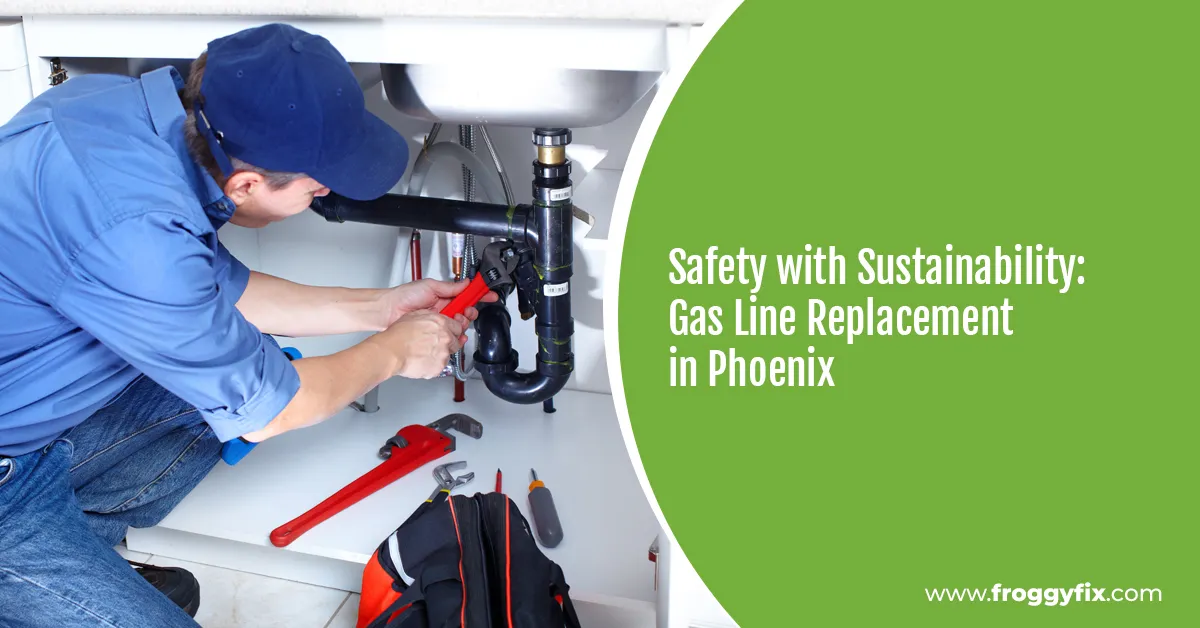

09 02
2024
Gas line replacement in Phoenix is a critical aspect of infrastructure maintenance and development. As the city continues to grow, ensuring the safety and sustainability of its gas pipelines becomes increasingly important. In this article, we will explore the significance of gas line replacement, addressing environmental impacts, sustainability concerns, human health effects, and the environmental consequences of burning natural gas.
Natural gas extraction processes, such as fracking, can have significant environmental impacts. Fracking involves injecting high-pressure fluids into underground rock formations to release natural gas. This process can lead to groundwater contamination, habitat disruption, and even earthquakes. In regions like Phoenix, where water resources are limited, the potential contamination of groundwater from fracking poses a serious threat to both the environment and public health. Therefore, prioritizing safe and sustainable gas extraction methods is crucial for minimizing these environmental impacts.
The sustainability of natural gas as an energy source is a topic of debate. While natural gas is considered cleaner than coal or oil in terms of greenhouse gas emissions when burned, its extraction and transportation processes raise concerns about sustainability. In Phoenix, where energy demand is high due to the city’s population growth and desert climate, transitioning to renewable energy sources such as solar and wind could offer a more sustainable long-term solution. However, in the short term, replacing aging gas lines with more efficient and leak-resistant pipelines can help improve the sustainability of natural gas usage in the city.
Exposure to natural gas can have adverse effects on human health. Methane, the primary component of natural gas, is a potent greenhouse gas that contributes to air pollution and climate change. In addition, natural gas often contains trace amounts of toxic compounds such as benzene and formaldehyde, which can pose health risks if released into the atmosphere. In Phoenix, where air quality is already a concern, ensuring the proper maintenance and replacement of gas lines is essential for protecting public health and reducing respiratory illnesses.
While natural gas is touted as a cleaner alternative to coal and oil, burning it still produces carbon dioxide and other greenhouse gases that contribute to global warming. In Phoenix, where temperatures are rising due to climate change, reducing greenhouse gas emissions is paramount for mitigating the impacts of extreme heat and preserving the city’s livability. Therefore, investing in energy-efficient appliances, promoting energy conservation practices, and transitioning to renewable energy sources are all crucial steps toward reducing the environmental consequences of burning natural gas in Phoenix.
Gas line replacement plays a vital role in ensuring the safety and sustainability of the city’s natural gas infrastructure. By replacing aging pipelines with newer, more durable materials, the risk of leaks and accidents can be significantly reduced. Moreover, upgrading gas lines allows for the integration of advanced monitoring and detection systems, further enhancing safety measures and minimizing environmental impacts. Additionally, prioritizing gas line replacement projects creates job opportunities and stimulates economic growth in the region, contributing to the overall well-being of the community.
Furthermore, gas line replacement projects in Phoenix present an opportunity to prioritize environmental justice and equity. Historically, marginalized communities have borne the brunt of environmental pollution and infrastructure neglect. By targeting gas line replacement efforts in areas disproportionately affected by poor air quality and industrial pollution, the city can address longstanding environmental disparities and improve the overall quality of life for residents. To get more information about gas line replacement services, check this out https://froggyfix.com/gas-line-replacement-in-phoenix-ensuring-safety-and-efficiency/.
In addition to addressing environmental concerns, gas line replacement also contributes to energy security and reliability. Aging gas pipelines are prone to leaks and ruptures, leading to service interruptions and potential safety hazards. By upgrading infrastructure and implementing modern technologies, such as remote monitoring and control systems, the city can enhance the resilience of its natural gas distribution network. This, in turn, ensures a more reliable supply of energy for homes, businesses, and essential services, especially during periods of high demand or emergencies.
Moreover, investing in gas line replacement projects aligns with broader efforts to transition to a low-carbon economy and mitigate the impacts of climate change. While natural gas is often viewed as a bridge fuel to a renewable energy future, the urgency of addressing climate change requires bold action to reduce greenhouse gas emissions across all sectors. By accelerating the deployment of renewable energy technologies and phasing out fossil fuel infrastructure, Phoenix can demonstrate leadership in combating climate change and fostering sustainable development.
Gas line replacement projects also offer an opportunity to engage with stakeholders and promote community participation in decision-making processes. By involving residents, businesses, and advocacy groups in planning and implementation efforts, the city can ensure that gas line replacement initiatives reflect the needs and priorities of the communities they serve. Furthermore, fostering transparent communication and collaboration builds trust and strengthens partnerships, laying the foundation for effective long-term management of infrastructure assets and resources.
Lastly, gas line replacement in Phoenix presents economic benefits beyond job creation and economic stimulus. By modernizing infrastructure and improving energy efficiency, the city can reduce operational costs and enhance competitiveness in the regional economy. Moreover, investing in sustainable infrastructure attracts private investment and fosters innovation, driving economic growth and fostering a thriving business ecosystem. Additionally, by prioritizing local hiring and contracting opportunities, gas line replacement projects can generate equitable economic opportunities and promote inclusive prosperity for all residents.
Gas line replacement in Phoenix is a multifaceted endeavor that encompasses safety, sustainability, equity, and economic development. By addressing environmental impacts, promoting renewable energy alternatives, enhancing energy security, engaging stakeholders, and fostering economic opportunities, the city can ensure a more resilient, equitable, and prosperous future for its residents. Through strategic planning, collaboration, and innovation, gas line replacement projects can serve as catalysts for positive change, driving progress toward a cleaner, safer, and more sustainable Phoenix for generations to come.